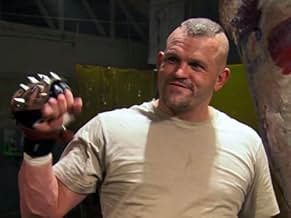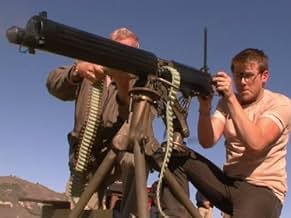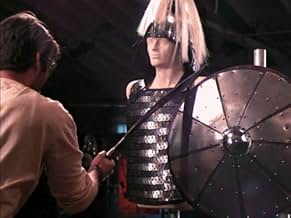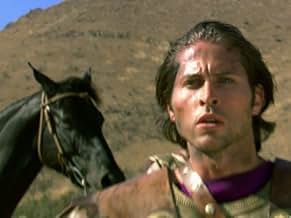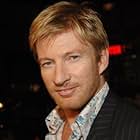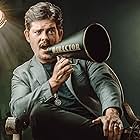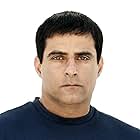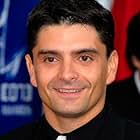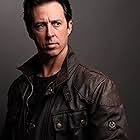Deadliest Warrior
- TV Series
- 2009–
- 42m
IMDb RATING
7.5/10
3.6K
YOUR RATING
The great warriors of history are examined for fantasy combat simulations.The great warriors of history are examined for fantasy combat simulations.The great warriors of history are examined for fantasy combat simulations.
Browse episodes
Storyline
Did you know
- TriviaThis show first aired April 2009. It quickly became the number one show on Spike.
- ConnectionsFeatured in How TV Ruined Your Life: Knowledge (2011)
Featured review
Action heavy, logic lapsed
I must first say about this series that the premise is outstanding, and one that has crossed my mind on numerous occasions. What would happen if a medieval knight met up with a samurai? Who would be victorious in battle?
The show then attempts to determine whom is the better warrior amongst two different kinds in history - in many cases two warriors that are separated by many centuries. The arms and armors available to these warriors are demonstrated, both in their lethal potential or in their stopping power in the case of armor. The demonstrations are fascinating, including weapons experts that strike or fire their weapons at ballistics gel encased, and presumably reproduction skeletons. A physician or medical specialist then examines the footage, or the dummy in some cases, and describes the type of trauma inflicted. At the end, we get a well choreographed fight between two re-enactors dressed in costume to simulate the potential outcome of such a contest, as well as a statistics model that determines the winner in 1,000 contests. I like this concept because despite the advantages a particular warrior might possess over another, the randomness of combat will ensure that even the presumably better warrior will lose at least a percentage of the time.
The problems with the show are many, however, and seriously challenge the credibility of the participants. As others have pointed out, a warrior is more than the sum of his weapons and armor, which the show spends the most amount of time demonstrating. I think the premise could be dropped and have the show focus on weapons demonstrations only. Although the mindset, culture, tactics, and goals of each warrior are mentioned, these descriptions are brief and superficial. In addition,the hypothetical combats displayed are all duels. Most of the warriors portrayed would rarely, if ever, be faced with a duel situation, instead fighting in a unit of many soldiers/warriors. The worst part for me has to be the banter or trash talk between the weapons experts representing each respective warrior. It reminds me of a WWE matchup or a pre-boxing/MMA trash session instead of a presumably serious and/or scientific look at a hypothetical combat situation.
At any rate, I do enjoy the show because it has many good aspects. But the flaws do not make for "must-see" TV. If they would focus a little more on the tactics, drop the banter, and perhaps consider tactical unit combat instead of duels, I believe the show would be much improved. The producers are obviously trying to cater to a younger, action thirsty crowd, perhaps in an effort to make history more interesting. I applaud this rationale if nothing else, but the more discriminating viewers with a desire for logical and factual history, such as myself, are often left wanting.
If any wish for a superior show with similarities to DW, check out an earlier History Channel series called "Conquest" with Peter Woodward. The latter is more mature, yet still with some light hearted moments. It covers nearly every criticism I have for DW and then some (see my review).
EDIT: I had not seen Season 3 prior to this original review, and S3 does cover some of my criticisms for the first two Seasons. The banter here has been toned down substantially and the combats all consist of units fighting each other. The warrior's mindsets, values, and motivations are explored with the addition of Richard Machowicz. I also liked the addition of the "X Factors" as well, or somewhat intangible characteristics such as mental health or physical fitness which could positively or negatively impact a side's performance. Overall the changes added a more serious and scientific component to the show that was a substantial improvement IMO.
There are still a few problems that I saw, particularly with the tendency to match two opponents who were not a very good matchup to begin with. Hannibal and Genghis Khan was a good example, as they were separated by nearly 1,400 years and Khan's armor and weapons technology was far superior. Same could be said of William the Conqueror and Joan of Arc. It was a little silly to see a unit of five men firing a heavy artillery piece at each other as well. The elite modern soldiers did not have weapons that they most likely would have carried. I am particularly thinking about the Rangers/North Korea and Gurkha/French Foreign Legion in that all these soldiers would have probably carried hand grenades and a pistol of some kind. Roosevelt/Lawrence of Arabia or even Washington/Napolean would have probably had pistols as well. Oddly enough, only Pancho Villa/Crazy Horse were depicted carrying pistols.
In general, the format changes in S3 were an improvement and I enjoyed it quite a bit more than the previous seasons.
The show then attempts to determine whom is the better warrior amongst two different kinds in history - in many cases two warriors that are separated by many centuries. The arms and armors available to these warriors are demonstrated, both in their lethal potential or in their stopping power in the case of armor. The demonstrations are fascinating, including weapons experts that strike or fire their weapons at ballistics gel encased, and presumably reproduction skeletons. A physician or medical specialist then examines the footage, or the dummy in some cases, and describes the type of trauma inflicted. At the end, we get a well choreographed fight between two re-enactors dressed in costume to simulate the potential outcome of such a contest, as well as a statistics model that determines the winner in 1,000 contests. I like this concept because despite the advantages a particular warrior might possess over another, the randomness of combat will ensure that even the presumably better warrior will lose at least a percentage of the time.
The problems with the show are many, however, and seriously challenge the credibility of the participants. As others have pointed out, a warrior is more than the sum of his weapons and armor, which the show spends the most amount of time demonstrating. I think the premise could be dropped and have the show focus on weapons demonstrations only. Although the mindset, culture, tactics, and goals of each warrior are mentioned, these descriptions are brief and superficial. In addition,the hypothetical combats displayed are all duels. Most of the warriors portrayed would rarely, if ever, be faced with a duel situation, instead fighting in a unit of many soldiers/warriors. The worst part for me has to be the banter or trash talk between the weapons experts representing each respective warrior. It reminds me of a WWE matchup or a pre-boxing/MMA trash session instead of a presumably serious and/or scientific look at a hypothetical combat situation.
At any rate, I do enjoy the show because it has many good aspects. But the flaws do not make for "must-see" TV. If they would focus a little more on the tactics, drop the banter, and perhaps consider tactical unit combat instead of duels, I believe the show would be much improved. The producers are obviously trying to cater to a younger, action thirsty crowd, perhaps in an effort to make history more interesting. I applaud this rationale if nothing else, but the more discriminating viewers with a desire for logical and factual history, such as myself, are often left wanting.
If any wish for a superior show with similarities to DW, check out an earlier History Channel series called "Conquest" with Peter Woodward. The latter is more mature, yet still with some light hearted moments. It covers nearly every criticism I have for DW and then some (see my review).
EDIT: I had not seen Season 3 prior to this original review, and S3 does cover some of my criticisms for the first two Seasons. The banter here has been toned down substantially and the combats all consist of units fighting each other. The warrior's mindsets, values, and motivations are explored with the addition of Richard Machowicz. I also liked the addition of the "X Factors" as well, or somewhat intangible characteristics such as mental health or physical fitness which could positively or negatively impact a side's performance. Overall the changes added a more serious and scientific component to the show that was a substantial improvement IMO.
There are still a few problems that I saw, particularly with the tendency to match two opponents who were not a very good matchup to begin with. Hannibal and Genghis Khan was a good example, as they were separated by nearly 1,400 years and Khan's armor and weapons technology was far superior. Same could be said of William the Conqueror and Joan of Arc. It was a little silly to see a unit of five men firing a heavy artillery piece at each other as well. The elite modern soldiers did not have weapons that they most likely would have carried. I am particularly thinking about the Rangers/North Korea and Gurkha/French Foreign Legion in that all these soldiers would have probably carried hand grenades and a pistol of some kind. Roosevelt/Lawrence of Arabia or even Washington/Napolean would have probably had pistols as well. Oddly enough, only Pancho Villa/Crazy Horse were depicted carrying pistols.
In general, the format changes in S3 were an improvement and I enjoyed it quite a bit more than the previous seasons.
- How many seasons does Deadliest Warrior have?Powered by Alexa
Details
Contribute to this page
Suggest an edit or add missing content



